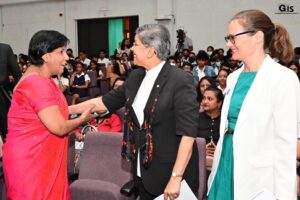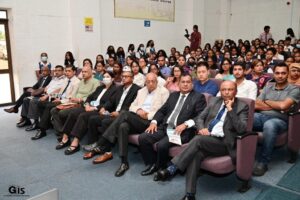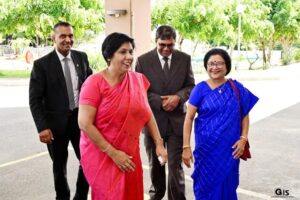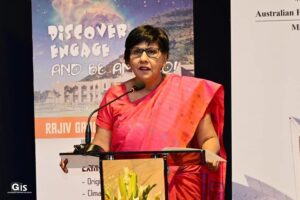Mauritius: To mark the International Day of Women and Girls in Science, commemorated annually on 11 February, the Rajiv Gandhi Science Centre, in collaboration with the High Commission of Australia in Mauritius, organised, today at its seat in Bell Village, a seminar on the theme ‘Forensic Science for the 21st Century’, to raise awareness of students on the contribution of women and girls to science and enable them to interact with a seasoned female Mauritian scientist.
The guest speaker for the seminar was the Director of the Forensic Science Laboratory (FSL) and the first female forensic scientist in Mauritius, Mrs Gowmatee Madhubala Madhub-Dassyne. Her main achievements at the FSL include, among others, the development of analytical methods for the identification of new psychoactive substances for Mauritius and the Southern African Development Community (SADC) region; the creation of DNA databases of offenders and crime scenes; and the ISO Accreditation of the FSL for its forensic services.
The Vice-Prime Minister, Minister of Education, Tertiary Education, Science and Technology, Mrs Leela Devi Dookun-Luchoomun; the Chargé d’Affaires of the Australian High Commission, Ms Keara Shaw; the Chairperson of the Rajiv Gandhi Science Centre Trust Fund, Mrs Ellora Dhunnoo; and other personalities attended the seminar.
In her address for the occasion, Mrs Leela Devi Dookun-Luchoomun reiterated the need to encourage people to join the scientific field and to motivate young people to study science, technology, engineering, and mathematics (STEM) subjects. She put forward the efforts of the Government to empower learners, irrespective of their gender, to study science subjects, such as the integration of science in the core learning areas in the curriculum from Grade 1.
Moreover, the Vice-Prime Minister averred that the opportunities for girls to embrace scientific fields of study did exist in Mauritius but were yet to be explored to their full potential. Mrs Dookun-Luchoomun informed that though the pass rate of girls was often higher than boys at national level exams in Mauritius, the figures pertaining to science subjects were less encouraging, with few girls opting for science subjects than boys. She deplored that there was a decreasing number of students taking up science subjects overall.
The Vice-Prime Minister underlined to address the underre
presentation of women in STEM, and it is essential to promote and publicise the achievements of women scientists.
She thus commended the Rajiv Gandhi Science Centre and the Australian High Commission for the initiative to encourage exposure to successful female role models in STEM fields so that schoolgirls would show interest in pursuing STEM careers.
“There is a lot of work to be done to disseminate information about research as well as researchers, especially women researchers,” she stated.

The necessity for more communication to combat the misconceptions about STEMS being difficult subjects that would result in having low-paid jobs was also highlighted by Mrs Dookun-Luchoomun.
In the same vein as the Vice-Prime Minister, the Australian Chargé d’Affaires underscored the critical influence that women working in the scientific field have as role models to inspire young girls to pursue a career in STEM. She also underscored the positive exchanges and partnerships between the High Commission of Australia in Mauritius and the Rajiv Gandhi Science Centre to increase the engagement of young people, especially women, in science and sustainability. These comprise joint projects like the ‘Young Mauritians Plans for the Planet’ and the Science Circus event.
As for the Director of the FSL, she dwelt, in her presentation, on the mandate of her organisation in helping in the proper administration of justice through the provision of a variety and a large spectrum of services at national and international levels.
She was of the view that the sector is in full expansion and in transition and that there would be a lot of opportunities for young people interested in science and using applied science to make a difference in people’s life.




